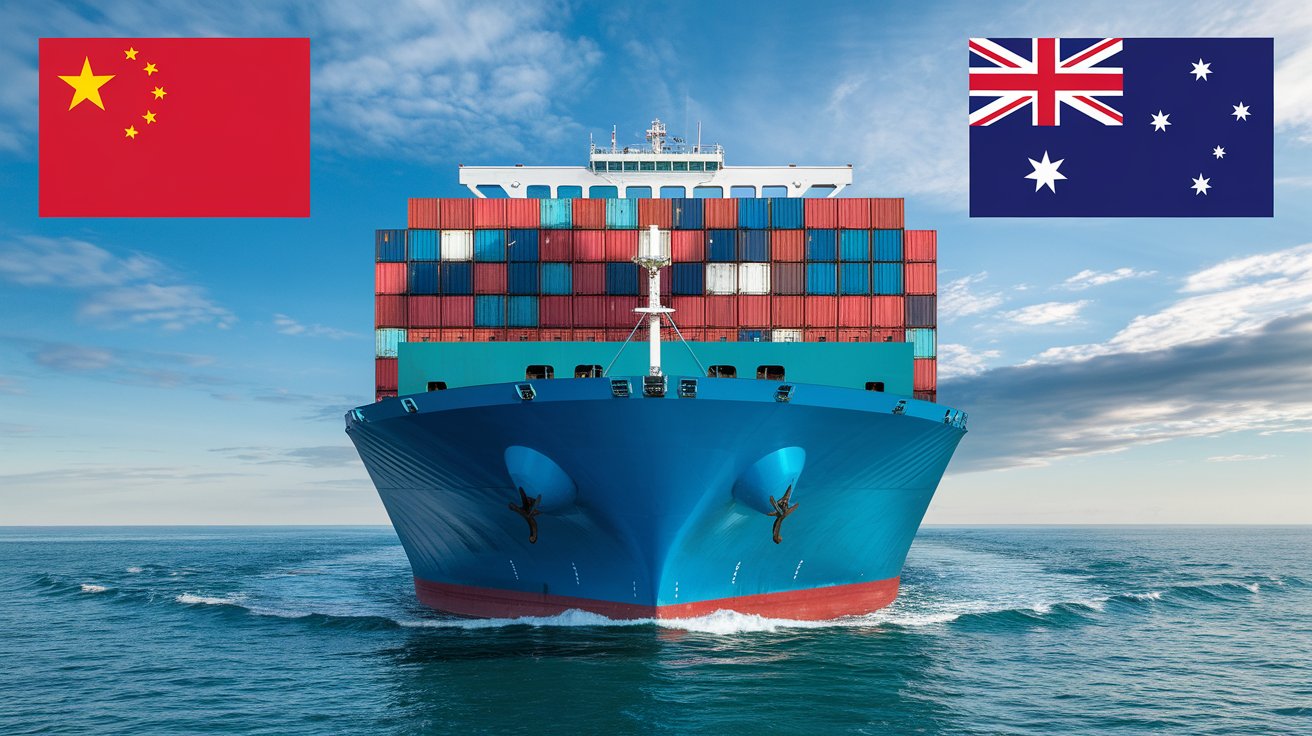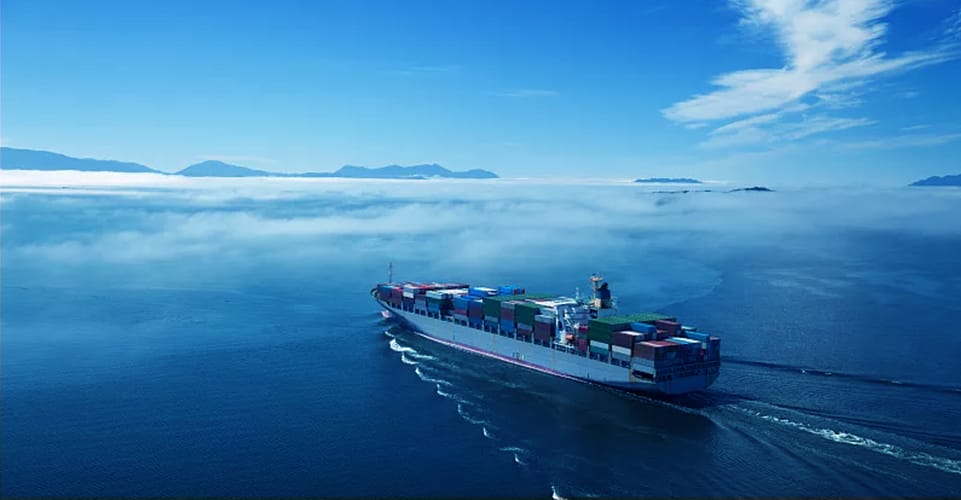Are you considering sea freight as a viable option for shipping from China to Lebanon?
This method is not only cost-effective but also accommodates large shipments and offers various container options. In this comprehensive guide, we will explore the benefits of choosing sea freight, the different types of services available, and the factors that influence shipping costs and transit times. Whether you’re new to international shipping or looking to optimize your existing logistics strategy, this blog provides valuable insights to help you navigate the complexities of sea freight.

Why Choose Sea Freight for Shipping from China to Lebanon?
When it comes to importing goods from China to Lebanon, choosing the right shipping method is crucial for cost efficiency and reliability. Sea freight has established itself as one of the most favored options for various reasons:
Cost-Effective
One of the most compelling advantages of sea freight is its cost-effectiveness. The shipping rates for sea transport are significantly lower compared to air freight, especially for larger shipments. According to recent data, the average cost for sea freight from China to Lebanon can range from $800 to $2,500 for a 20ft container, depending on the specific ports involved and current market conditions. This makes sea freight a practical choice for businesses looking to maximize their profit margins while ensuring their products reach the market.
Accommodates Large Shipments
Sea freight is particularly well-suited for large shipments. Unlike air freight, which has strict weight limits, shipping by sea allows for the transport of bulk goods. This is particularly advantageous for manufacturers and wholesalers who need to ship large quantities of goods efficiently. By opting for sea freight, businesses can consolidate their shipments, reducing overall transportation costs.
Versatile Container Options
Shipping via sea offers a variety of container options to meet different shipping needs. Whether you are shipping textiles, electronics, or machinery, you can choose from Full Container Load (FCL) or Less Than Container Load (LCL) services. FCL allows you to have exclusive use of a container, while LCL lets you share container space with other shipments, providing flexibility depending on your volume and budget. For more information on LCL and FCL, visit our page on what is LCL and FCL in shipping.
Reliable Transit Times
Sea freight is known for its reliable transit times. While it may take longer compared to air freight, sea transport typically provides consistent schedules and delivery times. For instance, the transit time from Shanghai to Beirut usually ranges from 30 to 45 days, a timeline you can plan around for inventory management and customer expectations. To learn about transit times for other routes, check our section on ocean freight.
Environmentally Friendly
In an age where sustainability is becoming increasingly important, sea freight stands out as a more environmentally friendly shipping option. Shipping goods by sea produces considerably lower carbon emissions per ton of cargo than air freight. This is an important consideration for businesses aiming to reduce their carbon footprint and improve their sustainability practices.
Reduced Risk of Damage
Another significant advantage of sea freight is the reduced risk of damage to goods during transportation. Containers used for sea shipping are designed to withstand adverse weather conditions and rough seas. This robust packaging minimizes the likelihood of damage, ensuring that products arrive in good condition, which is particularly crucial for sensitive and high-value items.
Types of Sea Freight Services
Understanding the different types of sea freight services available is essential for choosing the right option for your shipping needs.
Less Than Container Load (LCL)
Less Than Container Load (LCL) shipping is ideal for businesses that have smaller shipments that do not fill an entire container. By sharing container space with other consignments, businesses can take advantage of lower shipping costs while still ensuring timely delivery. This option is perfect for startups and small-to-medium enterprises that may not have the volume to justify a full container.
Full Container Load (FCL)
For larger shipments, Full Container Load (FCL) is the preferred choice. This service allows the shipper to have exclusive use of an entire container, which can be more efficient and secure for bulk goods. FCL is particularly beneficial for businesses that need to transport high-value items or goods that require careful handling, as it minimizes the risk of damage or loss associated with shared shipments. An FCL also often provides faster customs clearance, enhancing overall shipping efficiency.
Whether you are opting for LCL or FCL, partnering with a reliable freight forwarder, such as Dantful International Logistics, can further enhance your shipping experience. We offer a comprehensive range of services, including ocean freight, customs clearance, and door-to-door delivery, ensuring your goods reach their destination safely and efficiently.
Factors Affecting Sea Freight Costs and Delivery Times
Shipping Ports
The choice of shipping ports significantly influences both the cost and delivery time of sea freight from China to Lebanon. Major ports in China such as Shanghai, Shenzhen, and Ningbo are well-equipped for international shipping, while key ports in Lebanon include Beirut and Tripoli.
Here’s a comparison table showcasing the major shipping ports and their impact on transit times:
| Port in China | Port in Lebanon | Estimated Transit Time (Days) | Port Activity Level |
|---|---|---|---|
| Shanghai | Beirut | 25-30 | High |
| Shenzhen | Tripoli | 28-34 | Medium |
| Ningbo | Beirut | 26-32 | High |
| Guangzhou | Tripoli | 30-35 | Medium |
The transit time can vary based on several factors, including shipping schedules and customs procedures. Selecting a port with higher activity levels may reduce waiting times and enhance overall efficiency.
Shipment Size and Weight
The size and weight of your shipment are critical factors in determining the cost of sea freight from China to Lebanon. Generally, larger shipments can benefit from economies of scale, leading to lower costs per unit. It is essential to accurately assess the dimensions and weight of your cargo to ensure proper planning and budgeting.
For example, shipping a Full Container Load (FCL) may be more economical for large shipments, while Less Than Container Load (LCL) is ideal for smaller consignments that do not fill an entire container. You can learn more about what is LCL and FCL in shipping.
Commodity Type
Certain commodity types can affect both costs and delivery times due to specific restrictions and regulations. For instance:
- Hazardous Materials: Shipments that fall under this category require special handling, labeling, and documentation, which can increase costs and delivery times.
- Perishable Items: Goods that are time-sensitive, such as fresh produce, may necessitate faster shipping options and temperature-controlled containers, thereby affecting costs.
It is crucial to check local regulations in Lebanon and consult with a qualified freight forwarder like Dantful International Logistics to ensure compliance and avoid delays.
Shipping From China to Middle East Countries:
- Shipping from China to Saudi Arabia
- Shipping from China to UAE
- Shipping from china to KUWAIT
- Shipping From China To EGYPT
- Shipping from China to Bahrain
- Shipping From China To Jordan
- Shipping From China To Israel
- Shipping from China to Qatar
- Shipping From China To IRAQ
- Shipping from China to Iran
Sea Freight Costs from China to Lebanon
Cost per Container
The cost per container for shipping from China to Lebanon typically varies based on the size of the container and the specific port pair used. Below is a comparison table showing the estimated freight rates for 20ft and 40ft containers:
| Container Size | Port Pair (China to Lebanon) | Estimated Cost (USD) |
|---|---|---|
| 20ft | Shanghai to Beirut | $1,500 – $2,000 |
| 20ft | Shenzhen to Tripoli | $1,700 – $2,200 |
| 40ft | Ningbo to Beirut | $2,800 – $3,500 |
| 40ft | Guangzhou to Tripoli | $3,000 – $3,700 |
Prices can vary considerably based on factors such as seasonal demand, fuel prices, and shipping line policies.
Additional Fees and Charges
In addition to the base freight cost, several additional fees may apply when shipping goods from China to Lebanon. These include:
- Customs Duties and Taxes: Import duties imposed by Lebanon can vary based on the type of goods being imported.
- Documentation Fees: Charges for the preparation and processing of shipping-related documents such as the bill of lading, commercial invoice, and packing list.
- Handling and Storage Costs: Fees associated with the loading, unloading, and storage of your goods at ports.
When planning your shipment, it is advisable to budget for these additional costs to avoid any surprises upon delivery. Working with an experienced freight forwarder like Dantful International Logistics can help you navigate these complexities and ensure a smooth shipping experience.
Sea Freight Transit Times from China to Lebanon
Port-to-Port Delivery
When shipping goods from China to Lebanon, understanding the typical transit times for major port pairs is crucial in planning your logistics strategy. The two most significant ports in China for international shipping are the Port of Shanghai and the Port of Shenzhen, while in Lebanon, the Port of Beirut is the primary gateway for seaborne trade.
| From Port | To Port | Transit Time (Days) |
|---|---|---|
| Shanghai | Beirut | 25-30 |
| Shenzhen | Beirut | 22-28 |
| Ningbo | Beirut | 24-29 |
| Guangzhou | Beirut | 26-31 |
Factors affecting these transit times include:
- Weather Conditions: Inclement weather can lead to delays at sea or in port operations.
- Port Congestion: High volumes of cargo can lead to longer waiting times at ports, affecting overall transit times.
- Customs Processes: Efficient customs clearance procedures are vital for timely delivery, as delays in documentation can prolong transit times significantly.
- Shipping Line Efficiency: Different shipping lines may have varying schedules and reliability, impacting the overall time to destination.
Door-to-Door Delivery
The importance of efficient customs clearance cannot be overstated when considering door-to-door delivery from China to Lebanon. This service not only encompasses the shipping of goods from the port of origin to the destination port but also involves transporting the goods to the final delivery address, which is often facilitated by the freight forwarder.
The impact of last-mile delivery should also be taken into account. After the cargo arrives at the Port of Beirut, the following factors can affect the delivery of goods to the final destination:
- Local Transport Infrastructure: The availability and quality of transportation routes can significantly influence delivery times.
- Customs and Regulatory Compliance: Ensuring that all necessary documents are in order before the arrival of the shipment can expedite customs clearance.
- Handling and Storage Facilities: The efficiency of local warehousing and handling services can also affect how quickly cargo can be delivered from the port to the customer’s door.
Choosing a freight forwarder like Dantful International Logistics can help mitigate these challenges, as they offer comprehensive services that include customs clearance and efficient last-mile delivery options.
Choosing a Reliable Freight Forwarder
Selecting a dependable freight forwarder is critical to ensuring a smooth shipping experience from China to Lebanon. Here are several key factors to consider:
Experience in China-Lebanon Trade
A freight forwarder with extensive experience in China-Lebanon trade will have a better understanding of the logistics involved, including familiarity with the specific regulations and requirements that apply to shipments between these two markets. This can lead to more efficient handling of your goods and potentially lower costs.
Service Quality and Customer Support
High-quality service and strong customer support are essential when choosing a freight forwarder. You want a provider that is responsive to your needs, can offer timely updates on the status of your shipment, and is able to address any issues that may arise during transit. Look for reviews and testimonials to gauge the experiences of other clients.
Customs Clearance Expertise
Navigating customs can be one of the more complex aspects of international shipping. A freight forwarder with expertise in customs clearance can help ensure that your shipments comply with all relevant regulations and avoid unnecessary delays. They can assist with documentation preparation, duty payments, and any other requirements specific to importing goods into Lebanon.
By partnering with a highly professional and cost-effective logistics provider like Dantful International Logistics, you can streamline your shipping process and ensure that your goods arrive in a timely and efficient manner. Our team is well-equipped to handle ocean freight, air freight, customs clearance, and more, making us your one-stop international logistics solution.

Young Chiu is a seasoned logistics expert with over 15 years of experience in international freight forwarding and supply chain management. As CEO of Dantful International Logistics, Young is dedicated to providing valuable insights and practical advice to businesses navigating the complexities of global shipping.





















 Afrikaans
Afrikaans Shqip
Shqip አማርኛ
አማርኛ العربية
العربية Հայերեն
Հայերեն Azərbaycan dili
Azərbaycan dili Euskara
Euskara Беларуская мова
Беларуская мова বাংলা
বাংলা Bosanski
Bosanski Български
Български Català
Català Cebuano
Cebuano Chichewa
Chichewa 简体中文
简体中文 繁體中文
繁體中文 Corsu
Corsu Hrvatski
Hrvatski Čeština
Čeština Dansk
Dansk Nederlands
Nederlands English
English Esperanto
Esperanto Eesti
Eesti Filipino
Filipino Suomi
Suomi Français
Français Galego
Galego ქართული
ქართული Deutsch
Deutsch Ελληνικά
Ελληνικά Kreyol ayisyen
Kreyol ayisyen Harshen Hausa
Harshen Hausa Ōlelo Hawaiʻi
Ōlelo Hawaiʻi עִבְרִית
עִבְרִית हिन्दी
हिन्दी Hmong
Hmong Magyar
Magyar Íslenska
Íslenska Igbo
Igbo Bahasa Indonesia
Bahasa Indonesia Gaeilge
Gaeilge Italiano
Italiano 日本語
日本語 Basa Jawa
Basa Jawa ಕನ್ನಡ
ಕನ್ನಡ Қазақ тілі
Қазақ тілі ភាសាខ្មែរ
ភាសាខ្មែរ 한국어
한국어 كوردی
كوردی Кыргызча
Кыргызча ພາສາລາວ
ພາສາລາວ Latin
Latin Latviešu valoda
Latviešu valoda Lietuvių kalba
Lietuvių kalba Lëtzebuergesch
Lëtzebuergesch Македонски јазик
Македонски јазик Malagasy
Malagasy Bahasa Melayu
Bahasa Melayu മലയാളം
മലയാളം Maltese
Maltese Te Reo Māori
Te Reo Māori मराठी
मराठी Монгол
Монгол ဗမာစာ
ဗမာစာ नेपाली
नेपाली Norsk bokmål
Norsk bokmål پښتو
پښتو فارسی
فارسی Polski
Polski Português
Português ਪੰਜਾਬੀ
ਪੰਜਾਬੀ Română
Română Русский
Русский Samoan
Samoan Gàidhlig
Gàidhlig Српски језик
Српски језик Sesotho
Sesotho Shona
Shona سنڌي
سنڌي සිංහල
සිංහල Slovenčina
Slovenčina Slovenščina
Slovenščina Afsoomaali
Afsoomaali Español
Español Basa Sunda
Basa Sunda Kiswahili
Kiswahili Svenska
Svenska Тоҷикӣ
Тоҷикӣ தமிழ்
தமிழ் తెలుగు
తెలుగు ไทย
ไทย Türkçe
Türkçe Українська
Українська اردو
اردو O‘zbekcha
O‘zbekcha Tiếng Việt
Tiếng Việt Cymraeg
Cymraeg יידיש
יידיש Yorùbá
Yorùbá Zulu
Zulu